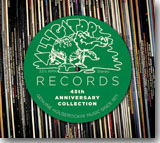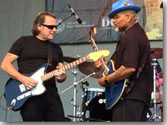|
Chicago Blues Festival
2016 review
Exposing The Next Generation Of Blues
Artists To The Next Generation Of Blues Fans
|
With great pride, Bruce Iglauer and his 15-person
Alligator Records staff triumphantly celebrated
their 45th Anniversary at this year’s Chicago Blues
Festival. Since its 1984 inception, the festival has
grown to become the largest free blues carnival in
the world. It attracts a wide range of fans – from
ardent to aloof – from all over the U.S. and Canada,
and as far away as the United Kingdom, Belgium, the
Netherlands, Poland, France, and Germany.
 Chicago-based
Alligator Records was founded by Bruce Iglauer (pictured to the right)
in 1971. Since then it has become the largest contemporary blues label
in the world. The label’s substantial catalog now contains almost 300
albums – many produced by Iglauer – which have won more than 100 Blues
Music Awards, over 70 Living Blues awards and three Grammy Awards among
41 Grammy nominations. “I’ve lived my dream,” states Iglauer. “Alligator
is a proudly independent label dedicated to releasing “Genuine
Houserockin’ Music” and spreading the good word about our artists around
the world. We’re still committed to bringing forward honest, unvarnished
and charismatic musicians who can move your body and stir your soul.”
Chicago-based
Alligator Records was founded by Bruce Iglauer (pictured to the right)
in 1971. Since then it has become the largest contemporary blues label
in the world. The label’s substantial catalog now contains almost 300
albums – many produced by Iglauer – which have won more than 100 Blues
Music Awards, over 70 Living Blues awards and three Grammy Awards among
41 Grammy nominations. “I’ve lived my dream,” states Iglauer. “Alligator
is a proudly independent label dedicated to releasing “Genuine
Houserockin’ Music” and spreading the good word about our artists around
the world. We’re still committed to bringing forward honest, unvarnished
and charismatic musicians who can move your body and stir your soul.”
Iglauer, a native of Cincinnati, first fell in love with the blues in
1966. A live performance by the great Mississippi Fred McDowell struck
him deep inside. "It was as if he reached out and grabbed me by the
collar, shook me and spoke directly to me," he recollects. After that
show, Iglauer immersed himself in the blues. In 1968, he made his
initial pilgrimage to Chicago. His first stop was the famous – and now
defunct – Jazz Record Mart, where he met proprietor Bob Koester, also
the owner of the prestigious blues and jazz label Delmark Records.
Iglauer moved to Chicago for good at the beginning of 1970, first to
take a job as the Delmark shipping clerk before starting his own label.
I caught up with Iglauer, who has said that he never wanted to be a
businessman, just prior to the festival and the release of the
Alligator Records 45th Anniversary Collection. Nervous energy and
unlimited enthusiasm exudes from Iglauer when you speak with him. He
possesses a great sense of humor although he takes everything about his
business, his artists, and blues music very seriously.
Tim Holek for Blues Bytes (BB): Congratulations on the
incredible achievement of the 45th anniversary of Alligator Records. In
your wildest dreams, how long did you think Alligator Records would last
when you began the label in 1971?
Bruce Iglauer (BI): When I began Alligator, I had only enough
money to record one album, Hound Dog Taylor & The HouseRockers,
and to press 1000 copies. After that, the label had to survive from
income generated by that first album. Eventually, I made enough to
record a second album, and then a third. For a few years, Alligator
released one record a year, because that’s all the label could afford.
So, the first year I thought Alligator might last a year. Each year
after that was a pleasant surprise. It took until about 1978 before I
felt the label had a secure future. After that, I never gave much
thought to how long it would last. It’s my life’s work, and I hope it
will continue after I can no longer be at the helm. Bob Koester is still
running Delmark at the age of 83, and Chris Strachwitz just sold
Arhoolie after 55 years. As Bob and Chris are my heroes, I guess I still
have some years to go.
BB: What motivates you to keep doing what you’ve been doing
for 45 years?
BI: The music above all. I began Alligator as a blues fan who
wanted to record his favorite band. Now, 45 years later, I’m a blues fan
who wants to record his favorite bands. And I keep hearing new ones!
Also, I’m very dogged, and I hate failing. So Alligator is both a great
source of pleasure to me and a personal crusade. I never had children,
so each record is like a child to me. I never have enough children!
BB: In the past couple of years, Alligator has focused a bit
more on younger and/or newer artists, e.g., Selwyn Birchwood, Toronzo
Cannon, Shemekia Copeland, Moreland & Arbuckle and Jarekus Singleton.
Why is the label taking this direction?
BI: For me, blues is a living, evolving music. I love the
tradition and all the older styles of blues. But if new artists try to
recreate what has already been done to perfection, the blues will become
petrified. You can’t beat B.B. doing B.B. or Muddy doing Muddy, so why
try? These days, I am looking for artists with strong roots in the
tradition, but who have a vision for creating blues that will speak to a
contemporary audience and keep the music relevant. That means not
sticking to the established chord patterns, rhythms or subjects of the
blues. The trick is to be true to the spirit of the tradition but not
the letter of the tradition. As far as the focus on younger artists, I
am looking for the artists who will carry the blues into the future.
Alligator is my legacy, and I want to assure that legacy’s going into
the future.
BB: How did you determine which artists and songs to include
on the new Alligator Records 45th Anniversary Collection?
BI: The challenge was not which artists to include, but coming
to grips with which ones I was going to have to leave off. Of course I
needed to include many of the iconic Alligator artists like Albert
Collins, Koko Taylor, Son Seals and Hound Dog Taylor. And I wanted to
include all the current members of the Alligator roster, including not
only my young visionaries whom you’ve already named, but also our
established ‘stars’ like Marcia Ball, Tommy Castro, Elvin Bishop, Curtis
Salgado, Lil’ Ed & The Blues Imperials, Roomful of Blues and Rick Estrin.
Finally, I wanted to shine the spotlight on some hidden or forgotten
tracks from the label’s history, like the track by Jimmy Johnson from
our 1978 Living Chicago Blues series and A.C. Reed’s "She’s Fine"
from his 1987 album. For every track I chose, there were 10 others I
would have liked to have included.
BB: Over the past few years, we have seen record labels and
record stores fold up and close down. The music industry continues to be
in turmoil, yet thankfully Alligator persists. What has been the
secret(s) to the success of Alligator?
 BI:
Our ‘secret’ isn’t very secret. First, make quality records by top-notch
artists, and push those artists to give us their very best. The best
blues albums are both contemporary and timeless. Second, make long-term
commitments to those artists. Koko Taylor was with Alligator for 35
years. Lil’ Ed (pictured to the left) has been with us since 1984. Many
of our artists have been with us more than a decade. Alligator promotes
and publicizes every gig by every one of our current roster, whether the
artist has a new release or not. We have two full-time publicists and
two full-time radio promoters as well as a new media specialist on
staff, and we promote over 1000 gigs a year. Third, never cease adapting
to the marketplace. Since 1971, we’ve released LPs, 8-tracks, cassettes,
CDs and digital files. We work with virtually all of the digital stores
and the on-demand streaming services. We promote on Twitter, Facebook
and other new media as well as in print (both paper on online) and on
radio (terrestrial and internet) and when possible, television. Fourth,
never lighten up on fulfilling our mission. I left the studio last night
at midnight, and I was working at 8 a.m. this morning. It’s now 9:30 on
Friday night and I’m still at work. The 15 dedicated members of the
Alligator staff work almost as hard as I do (although they do take time
to have personal lives, which I only occasionally do).
BI:
Our ‘secret’ isn’t very secret. First, make quality records by top-notch
artists, and push those artists to give us their very best. The best
blues albums are both contemporary and timeless. Second, make long-term
commitments to those artists. Koko Taylor was with Alligator for 35
years. Lil’ Ed (pictured to the left) has been with us since 1984. Many
of our artists have been with us more than a decade. Alligator promotes
and publicizes every gig by every one of our current roster, whether the
artist has a new release or not. We have two full-time publicists and
two full-time radio promoters as well as a new media specialist on
staff, and we promote over 1000 gigs a year. Third, never cease adapting
to the marketplace. Since 1971, we’ve released LPs, 8-tracks, cassettes,
CDs and digital files. We work with virtually all of the digital stores
and the on-demand streaming services. We promote on Twitter, Facebook
and other new media as well as in print (both paper on online) and on
radio (terrestrial and internet) and when possible, television. Fourth,
never lighten up on fulfilling our mission. I left the studio last night
at midnight, and I was working at 8 a.m. this morning. It’s now 9:30 on
Friday night and I’m still at work. The 15 dedicated members of the
Alligator staff work almost as hard as I do (although they do take time
to have personal lives, which I only occasionally do).
BB: What is the hardest lesson you have learned about the
blues music business?
BI: That it’s constantly changing, and you’re never, ever
secure. Alligator struggled for a decade to get started and create a
large enough catalog so we didn’t have to depend on the sales of each
record to pay for the next one. Then we had 20 years of solid growth,
releasing some now-classic recordings and growing to a company of 22
people doing business all over the world. Then, in 1999, with the
beginnings of digital piracy, the world got the idea that music should
be free. Since then, the entire recording industry has been shrinking
(including Alligator). Downloads were less profitable than CDs.
Streaming is way, way less profitable than downloads. No record label,
big or small, can figure out how (or if) it will survive into the
future, and Alligator is no different. We still do business all over the
world, but with 16 employees instead of 22. And of course, the blues
audience has been steadily aging, which means buying less music and
attending fewer gigs. There hasn’t been a recent crossover artist to
lead a mass of younger folks to the blues. A lot of my competitor labels
are gone or struggling —Rounder doesn’t release blues any more, Blind
Pig was recently sold, Delta Groove’s founder died last year and the
label has only recently announced some new releases, and there are
virtually no blues artists on any of the ‘major’ labels. And with B.B.’s
death, the only ‘household name’ in the blues is Buddy Guy—a great
artist but almost 80 years old. We need new blues champions who can
reach a wider audience than just existing blues fans and carry the blues
into the future. Alligator has been a ‘bridge’ to bring artists to their
potential audience. Now more than ever, it’s our job to expand the
audience for our artists and for the blues as a whole. Luckily, for all
the business problems in front of us, the blues sustains us and feeds
our souls, and gives us the energy to keep up the good fight.
 Alligator Records has just released the Alligator Records 45th
Anniversary Collection. The 2CDs-for-the-price-of-one set --
boasting over 148 minutes of music -- features career-defining
performances from blues royalty past, present and future. The
distinctive collection clearly lays out Alligator’s wide-ranging,
forward-looking vision with tracks from newer voices seamlessly
programmed next to legendary artists including Joe Louis Walker, Delbert
McClinton, Anders Osborne, The Holmes Brothers, Guitar Shorty, JJ Grey &
Mofro, and Ann Rabson. Together, the Alligator Records 45th
Anniversary Collection presents a comprehensive portrait of this
singular, rooted, soul-stirring American music.
Alligator Records has just released the Alligator Records 45th
Anniversary Collection. The 2CDs-for-the-price-of-one set --
boasting over 148 minutes of music -- features career-defining
performances from blues royalty past, present and future. The
distinctive collection clearly lays out Alligator’s wide-ranging,
forward-looking vision with tracks from newer voices seamlessly
programmed next to legendary artists including Joe Louis Walker, Delbert
McClinton, Anders Osborne, The Holmes Brothers, Guitar Shorty, JJ Grey &
Mofro, and Ann Rabson. Together, the Alligator Records 45th
Anniversary Collection presents a comprehensive portrait of this
singular, rooted, soul-stirring American music.
On June 10, the day of the album's release, the City Of Chicago
celebrated the label's 45th anniversary during the 33rd Annual Chicago
Blues Festival in Grant Park. Alligator artists who performed on that
day included Moreland & Arbuckle, Curtis Salgado, Shemekia Copeland,
Lil’ Ed & The Blues Imperials, Tommy Castro & The Painkillers, Toronzo
Cannon, and Corky Siegel.
The commemoration began at 11:30 am on the festival’s first day with
a panel discussion where Iglauer discoursed the history of his blues
expedition with Alligator Records. Without a doubt, the three hour and
40 minute Alligator showcase on the Petrillo main stage was a richly
fulfilling experience for musician and fan alike.
 On
"Common Ground" and "Serves Me Right To Suffer," Tommy Castro (pictured
to the left with Toronza Cannon) sang charismatically with his
roadhouse voice, and played wailing guitar. Castro has greatly helped to
develop the contemporary blues sound of today. Castro is quoted: ‘It’s
not about me and my guitar. It’s about the band and the songs’. With
contemporary lyrics about things middle-aged baby boomers could relate
to, Castro connected with the crowd on many levels.
On
"Common Ground" and "Serves Me Right To Suffer," Tommy Castro (pictured
to the left with Toronza Cannon) sang charismatically with his
roadhouse voice, and played wailing guitar. Castro has greatly helped to
develop the contemporary blues sound of today. Castro is quoted: ‘It’s
not about me and my guitar. It’s about the band and the songs’. With
contemporary lyrics about things middle-aged baby boomers could relate
to, Castro connected with the crowd on many levels.
Chicago-born-and-raised blues guitarist /vocalist/ songwriter Toronzo
Cannon is the liberator of next generation blues guitarists. That was
evidenced by his flamboyant performances of "Bad Contract" and "Walk It
Off." His song writing is inspired by his deep, homegrown Chicago roots,
his years observing the public while working as a city bus driver on the
West Side, and his own battles and triumphs. According to Cannon, "To be
from Chicago and be signed to Alligator is unreal.”
Too many people only see and hear a novelty act when it comes to Lil’
Ed & The Blues Imperials. Ed’s entertaining stage antics (performing
duckwalks and backbends, popping his eyeballs out, etc.) are memorable.
However, the five foot one inch entertainer possesses more talent than a
court jester. With respect and admiration, he has had the same
four-member core band for more than 25 years! Combining honest vocals
with searing slide guitar, Williams is the J. B. Hutto of our
generation. Lil’ Ed was equally proficient in delivering pleasurable
ballads "Troubled World" in addition to raucous rockers "Hold That
Train." Their set was raw, heavy, and wild – featuring wicked slide
guitar. Perhaps more than any other artist on Alligator’s active roster,
Williams embodies the very reason Iglauer created his respected record
label.
The attractive and full figured singer Shemekia Copeland, who began
her career on Alligator, concluded the show. Copeland possesses one of
the most mighty and distinguished voices on the global music scene
today. Quite frankly, she is a master of the greatest instrument – the
human voice. Miraculously, her vocals sounded sweet on "Somebody Else’s
Jesus," mean on "Devil’s Hand," and tender on "Ghetto Child." She
invited Iglauer out to the stage where he graciously thanked the fans
and city for their ongoing support. Then, many of the Alligator artists
returned to the stage and jammed a medley of blues standards.
Rolling Stone says, "Alligator Records has reached dizzying
heights in celebrating the blues." Yet, the esteemed record company
never rests on its laurels. According to Iglauer, "Alligator should be
the label that's exposing the next generation of blues artists and
bringing their music to the next generation of blues fans. I want the
future of the blues and the future of Alligator Records to be one and
the same. I want to keep bringing blues and roots music to new fans and
getting them as excited about the music as I am."
Special thanks to Bruce Iglauer, Marc Lipkin, Eli Martinez, and the
entire Alligator staff as well as Mary May and everyone at the City of
Chicago’s Department of Cultural Affairs and Special Events.
--- Tim Holek (text and all photos)